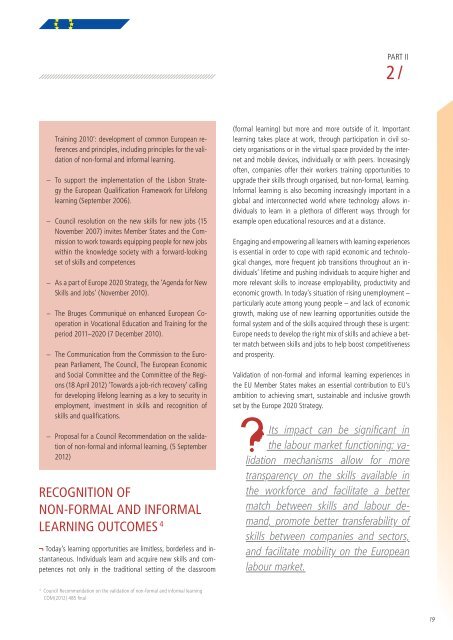RECOGNITION OF NON-FORMAL AND INFORMAL ... - Solidar
RECOGNITION OF NON-FORMAL AND INFORMAL ... - Solidar
RECOGNITION OF NON-FORMAL AND INFORMAL ... - Solidar
Create successful ePaper yourself
Turn your PDF publications into a flip-book with our unique Google optimized e-Paper software.
PART II<br />
2 /<br />
Training 2010’: development of common European references<br />
and principles, including principles for the validation<br />
of non-formal and informal learning.<br />
− To support the implementation of the Lisbon Strategy<br />
the European Qualifi cation Framework for Lifelong<br />
learning (September 2006).<br />
− Council resolution on the new skills for new jobs (15<br />
November 2007) invites Member States and the Commission<br />
to work towards equipping people for new jobs<br />
within the knowledge society with a forward-looking<br />
set of skills and competences<br />
− As a part of Europe 2020 Strategy, the ‘Agenda for New<br />
Skills and Jobs’ (November 2010).<br />
− The Bruges Communiqué on enhanced European Cooperation<br />
in Vocational Education and Training for the<br />
period 2011–2020 (7 December 2010).<br />
− The Communication from the Commission to the European<br />
Parliament, The Council, The European Economic<br />
and Social Committee and the Committee of the Regions<br />
(18 April 2012) ‘Towards a job-rich recovery’ calling<br />
for developing lifelong learning as a key to security in<br />
employment, investment in skills and recognition of<br />
skills and qualifi cations.<br />
− Proposal for a Council Recommendation on the validation<br />
of non-formal and informal learning, (5 September<br />
2012)<br />
<strong>RECOGNITION</strong> <strong>OF</strong><br />
<strong>NON</strong>-<strong>FORMAL</strong> <strong>AND</strong> IN<strong>FORMAL</strong><br />
LEARNING OUTCOMES 4<br />
¬ Today‘s learning opportunities are limitless, borderless and instantaneous.<br />
Individuals learn and acquire new skills and competences<br />
not only in the traditional setting of the classroom<br />
(formal learning) but more and more outside of it. Important<br />
learning takes place at work, through participation in civil society<br />
organisations or in the virtual space provided by the internet<br />
and mobile devices, individually or with peers. Increasingly<br />
often, companies offer their workers training opportunities to<br />
upgrade their skills through organised, but non-formal, learning.<br />
Informal learning is also becoming increasingly important in a<br />
global and interconnected world where technology allows individuals<br />
to learn in a plethora of different ways through for<br />
example open educational resources and at a distance.<br />
Engaging and empowering all learners with learning experiences<br />
is essential in order to cope with rapid economic and technological<br />
changes, more frequent job transitions throughout an individuals‘<br />
lifetime and pushing individuals to acquire higher and<br />
more relevant skills to increase employability, productivity and<br />
economic growth. In today‘s situation of rising unemployment –<br />
particularly acute among young people – and lack of economic<br />
growth, making use of new learning opportunities outside the<br />
formal system and of the skills acquired through these is urgent:<br />
Europe needs to develop the right mix of skills and achieve a better<br />
match between skills and jobs to help boost competitiveness<br />
and prosperity.<br />
Validation of non-formal and informal learning experiences in<br />
the EU Member States makes an essential contribution to EU‘s<br />
ambition to achieving smart, sustainable and inclusive growth<br />
set by the Europe 2020 Strategy.<br />
Its impact can be signifi cant in<br />
the labour market functioning: validation<br />
mechanisms allow for more<br />
transparency on the skills available in<br />
the workforce and facilitate a better<br />
match between skills and labour demand,<br />
promote better transferability of<br />
skills between companies and sectors,<br />
and facilitate mobility on the European<br />
labour market.<br />
4<br />
Council Recommendation on the validation of non-formal and informal learning<br />
COM(2012) 485 fi nal<br />
19
















